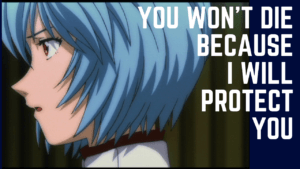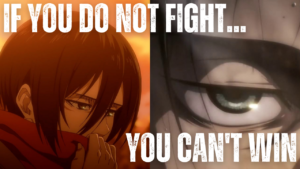Let’s learn Japanese with Kenshin’s quote from Rurouni Kenshin.
CONTENTS
Video
Kenshin’s Quote
Japanese: 時代を創るのは刀ではなくそれを扱う人でござる。
Romaji: jidai o tsukuru no wa katana dewanaku sore o atsukau hito de gozaru.
English: The ones who create an era are not swords but the people who wield the swords.
Analysis
Topic: 時代を創るの
時代 means ”era” and the を particle indicates that 時代 is the direct object of the action 創る meaning “to create”.
For learners who are learning kanji, there are three kanjis for つくる.
- 創る – “to bring something new and original into existence” such as new school, new world and so on. Kenshin is talking about creating the new era so this kanji is used.
- 作る (more commonly used) – “to form something small or something intangible by putting things together” such as food, songs, and so on.
- 造る – “to form something tangible on a large scale by putting things together” such as ships, money and so on.
The の particle makes the verb work as a noun. So 時代を創るの means “the ones who create an era”.
Predicate: 刀ではなくそれを扱う人でござる
The grammar is AではなくB meaning “not A but B”.
The A is 刀 meaning “a Japanese sword” and the B is “それを扱う人”.
それ means “it” which is 刀, を is the direct object particle, 扱う means “handle or wield something” and the clause それを扱う modifies 人 meaning “people”, so それを扱う人 means “the people who wield the swords”. Therefore, 刀ではなくそれを扱う人 means “not swords but the people who wield the swords”.
Lastly, でござる – I’m sure you’ve never heard this in real life but it’s often used by ninja or samurai in anime. It was actually used by samurai like Kenshin in the Edo era. So if I change this sentence into the modern style, it will be 時代を創るのは刀ではなくそれを扱う人です. Also, ではなく sounds stiff and formal so じゃなくて is often used in casual speech.
Examples
創る/作る/造る (to make)
この学校は明治時代に創られた。
kono gakkō wa meiji-jidai ni tsukurareta.
This school was created in the Meiji era.
私が作った歌を聞いてください。
watashi ga tsukutta uta o kiite kudasai.
Please listen to the song that I made.
あれは船を造る工場だよ。
are wa fune o tsukuru kōjō da yo.
That is the factory where ships are made.
AではなくB (not A but B in formal speech)
大事なのは外見ではなく性格です。
daiji nano wa gaiken dewanaku seikaku desu.
What is important is not looks but personality.
私が得意なのは英語ではなくスペイン語です。
watashi ga tokui nano wa eigo dewanaku supeingo desu.
What I’m good at is not English but Spanish.
AじゃなくてB (not A but B in casual speech)
道が混むかもしれないから、車じゃなくて電車で行こう。
michi ga komu kamoshirenai kara, kuruma janakute densha de ikō.
There might be traffic so let’s go by train, not by car.
やっぱり魚じゃなくて肉にします。
yappari sakana janakute niku ni shimasu.
I will actually have the meat, not the fish.
A and B are both nouns.
Support Easy Peasy Japanesey
If you enjoy our content, please consider supporting Easy Peasy Japanesey. Your support will help keep us going. Thank you for your support!


